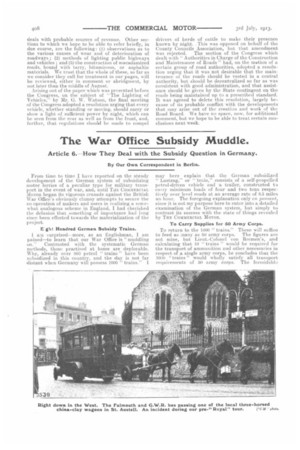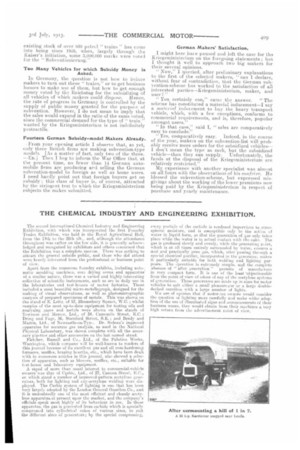The War Office Subsidy Muddle.
Page 2

Page 3

If you've noticed an error in this article please click here to report it so we can fix it.
Article 6. How They Deal with the Subsidy Question in Germany.
By Our Own Correspondent in Berlin.
From time to time I have reported on the steady development of the German system of subsidizing motor lorries of a peculiar type for military transport in the event of war, and; until T.EIE COMMERCIAL MOTOR, began its vigorous crusade against the British War Office's obviously clumsy attempts to secure the co-operation of makers and users in realizing a somewhat analogous scheme in England, I had cherished the delusion that something of importance had ling since been effected towards the materialization of the project.
E-ght Hundred German Subsidy Trains.
1 am surprised—more, as an Englishman, I am pained—to learn that our War Office is "muddling
on. Contrasted with the systematic German methods, those practised at home are deplorable. Why, already over 800 petrol "trains " have been subsidized in this country, and the day is not far distant when Germany will possess 1000 "trains." I may here explain that the German subsidized " La.stzug," or " train," consists of a self-propelled petrol-driven vehicle and -a trailer, constructed to carry minimum loads of four and two tons respectively over level roads at an average rate of 8.5 miles an hour. The foregoing explanation only enpet,s3ant, since it is not my purpose here to enter into a detailed examination of the German system, but simply to contrast its success with the state of things revealed by THE COMMERCIAL MOTOR.
To Carry Supplies for 50 Army Corps.
To return to the 1000 " trains." These will suffice to feed as :many as 50 army corps. The figures are not mine, but Lieut.-Colonel von Bremen's, and calculating that 10 "trains " would be required for the transport of ammunition and other necessaries in respect of a, single army corps, he concludes that the 1000 "trains " would wholly satisfy all transport requirements of 50 army corns. The formidable
existing stock of over 800 petrel." trains " has come into being since 1909, when, largely through the _Kaiser's initiation, some 3,000,000 marks were voted for the " Subventionierung."
Too Many Vehicles for which Subsidy Money is Asked.
In Germany, the question is not how to induce makers to turn out these " trains," or to get business houses to make use of them, but how to get enough money voted by the Reichstag for the subsidizing of all vehicles of which makers could dispose. Hence, the rate of progress in Germany is controlled by the supply of public money granted for the purpoe of subvention. However, I do not mean to imply that the sales would expand in the ratio of the sums voted, since the commercial demand for the type of " train " wanted by the Kriegsministeriurn is not indefinitely protractile.
Fourteen German Subsidy-model Makers Already.
• From your opening article I observe that, as yet, only three British firms are making subvention-type models. [As a matter of fact, only two of the three. —En.] Then T. beg to inform the War Office that, at the present time, no fewer than 14 German automobile firms are producing and selling the German subvention-model to foreign as well as home users. I need hardly point out that foreign buyers get no subsidy ; this class of buyer is, of course, attracted by the stringent test to which the Kriegsministerium subjects the makes submitted. German Makers' Satisfaction, I might here have paused and left the ease for the Kriegsministe!ium on the foregoing statements; but I thought it well to approach two Leig makers for their several opinions.
" Now," I queried, after preliminary explanations to the first of the selected makers, " can I declare, without fear of contradiction, that the German sub: vention-scheme has worked to the satisfaction of ah interested parties—Eriegsrninisterium, maker, and user?"
" You certainly can," came the answer. " The scheme has constituted a material inducement—I say a material irsducenrent to buy the heavy transport vehicle, which, with a few exceptions, conforms to commercial requirements, and is, therefore, popular amongst users."
" in that ease," said I, " sales are comparatively easy to conclude."
" Yes, comparatively easy. Indeed, in the course of the yoax, makers on the subvention-list will probably receive more orders for the subsidized vehicles--1 don't mean the type as such, but the subsidized vehicle—than they can supply. Unfortunately, the funds at the disposal of the Kriegsministerium are relatively restricted."
My experience with another specialist was almost on all fours with the observations of his con hire. He blessed the subvention-scheme, but expressed misgivings about the working of the lower premiums now being paid by the Kriegsministerium in respect of purchase and yearly maintenance.


































